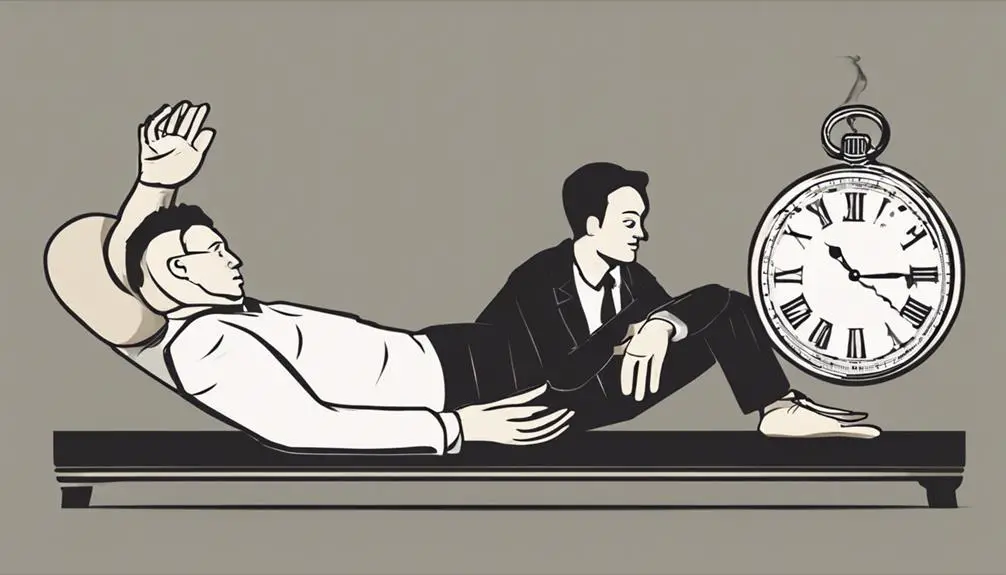Hypnosis Debunked
What Are the Top Hypnosis Myths Debunked?
July 27, 2017 - Hypnosis Debunked
Hypnosis debunked myths include: It's not mind control but a collaborative therapy; it doesn't work instantly but requires time and patience; it's effective on various mental states and can work on strong minds too; it doesn't unlock hidden memories but enhances recall; it's generally safe when done ethically with trained professionals. To fully understand the truths behind these myths, explore the nuances and benefits of hypnosis in facilitating positive changes in behaviors and mental states.
Myth: Hypnosis Is Mind Control

Contrary to popular belief, hypnosis is not a form of mind control but rather a collaborative process between the hypnotist and the individual being hypnotized. Within the realm of hypnotherapy, ethical boundaries play a crucial role in ensuring that the process remains respectful and beneficial for the client.
Hypnotherapy, when conducted ethically, can offer a range of therapeutic benefits. Ethical boundaries in hypnosis involve obtaining informed consent from the client, ensuring confidentiality, and respecting the client's autonomy throughout the process. The hypnotist must prioritize the well-being of the individual and work within these boundaries to foster a safe and trusting environment.
Therapeutic benefits of hypnosis can include alleviating anxiety, improving sleep quality, managing pain, and enhancing self-confidence. Through a collaborative approach, hypnotherapy aims to tap into the subconscious mind to facilitate positive changes in thought patterns and behaviors.
Myth: Hypnosis Works Instantly
While hypnosis is often depicted as a quick-fix solution in popular media, the myth that hypnosis works instantly overlooks the nuanced and individualized nature of the hypnotic process. Contrary to the belief in immediate results, hypnosis typically requires time, practice, and patience to achieve significant changes.
Instant results are rare and often unrealistic expectations of hypnotherapy. The effectiveness of hypnosis varies among individuals due to factors like suggestibility, willingness to participate, and the complexity of the issue being addressed. It is essential to recognize that the hypnotic process involves a gradual shift in perception, behavior, and cognition, rather than a sudden transformation.
Patience is a fundamental aspect of hypnosis, as it allows individuals to explore the depths of their subconscious mind and work through underlying issues at their own pace. Rushing the process or expecting instant results can hinder the overall effectiveness of hypnotherapy.
Therefore, understanding that hypnosis requires time and commitment is crucial for maximizing its benefits and achieving lasting change.
Myth: Hypnosis Only Works on Weak Minds

Some misconceptions suggest that hypnosis exclusively impacts individuals with weaker mental states, perpetuating the myth that hypnosis only works on weak minds. This strength misconception stems from a misunderstanding of the nature and effectiveness of hypnosis.
In reality, hypnosis is a therapeutic technique that can be effective for individuals across a wide spectrum of mental strengths and conditions.
The idea that only weak-minded individuals can be hypnotized overlooks the fact that hypnosis is a state of focused attention and heightened suggestibility, rather than a measure of mental weakness. Research has shown that people with strong mental faculties can also be successfully hypnotized, demonstrating that the ability to enter a hypnotic state is not limited to those deemed as having weaker minds.
Moreover, the misunderstood effectiveness of hypnosis lies in its ability to tap into the subconscious mind and facilitate behavioral change, regardless of the individual's perceived mental strength.
Myth: Hypnosis Unlocks Hidden Memories
Research indicates that the belief that hypnosis unlocks hidden memories is a common misconception that lacks empirical support. While hypnosis can enhance memory recall, it does not grant access to forgotten or repressed memories. In fact, studies have shown that hypnosis can sometimes lead to the creation of false memories. Individuals under hypnosis may be more susceptible to suggestion, potentially resulting in the inadvertent fabrication of memories that feel real to the individual, but are not based on actual events.
Despite the lack of evidence supporting the idea that hypnosis uncovers hidden memories, this technique still holds therapeutic benefits. Hypnosis can be a valuable tool in addressing various psychological and behavioral issues, such as anxiety, phobias, and smoking cessation. By tapping into the subconscious mind, hypnosis can help individuals explore their thoughts, emotions, and behaviors, leading to personal insights and positive changes.
While hypnosis may not reveal hidden memories, its therapeutic applications remain promising in the field of mental health and wellness.
Myth: Hypnosis Can Cause Harm

The notion that hypnosis can cause harm is a prevalent misconception that warrants scrutiny and clarification within the realm of psychological practice. Contrary to common belief, hypnosis, when conducted by a trained professional following ethical guidelines, is generally considered safe. Research suggests that hypnosis can offer potential benefits such as reducing anxiety, managing pain, and aiding in behavior modification.
However, like any therapeutic intervention, there are ethical considerations to be mindful of when utilizing hypnosis. Ethical considerations in hypnosis include obtaining informed consent from the individual before the session, ensuring confidentiality of the information shared during hypnosis, and maintaining a professional boundary throughout the process. Furthermore, it is crucial for the hypnotist to have appropriate training and qualifications to conduct hypnosis safely.
When these ethical principles are upheld, the likelihood of harm occurring during hypnosis is minimal. Therefore, debunking the myth that hypnosis can cause harm is essential to promote a more accurate understanding of this therapeutic technique.
Frequently Asked Questions
Can Hypnosis Make Me Do Things Against My Will?
Hypnosis, when conducted ethically by a trustworthy professional, does not override free will or force individuals to act against their morals. Mental manipulation is not a goal; rather, hypnosis aims to facilitate positive changes through consent and cooperation.
Will Hypnosis Work on Everyone?
Individual differences play a crucial role in the effectiveness of hypnosis. While some individuals are highly susceptible to hypnotic suggestions, not everyone responds in the same way. Ethical considerations dictate the importance of obtaining informed consent before conducting hypnosis sessions.
Can Hypnosis Help Me Remember Forgotten Childhood Events?
Memory retrieval through hypnosis can be a tool for exploring forgotten childhood events. While therapeutic benefits are possible, caution is advised due to the potential for creating false memories or retraumatizing individuals during regression therapy.
Is It Possible to Get Stuck in a Hypnotic State?
Hypnotic safety is a paramount concern, and misconceptions about being stuck in a hypnotic state persist. However, individuals cannot remain in hypnosis indefinitely. Trained hypnotherapists are equipped to guide individuals safely in and out of hypnotic states.
Can Hypnosis Lead to False Memories?
Hypnosis, when used inappropriately or by untrained individuals, can potentially lead to the creation of false memories. This raises ethical concerns regarding the reliability of memories retrieved through hypnosis and highlights the importance of ensuring proper training and ethical guidelines in therapeutic settings.
Conclusion
In conclusion, the top hypnosis myths have been debunked through empirical evidence and analysis. Hypnosis is not mind control and does not work instantly. It is also not limited to weak minds and does not unlock hidden memories. Additionally, hypnosis does not cause harm.
By understanding the true nature of hypnosis and dispelling these common misconceptions, individuals can appreciate the potential benefits of hypnosis as a therapeutic tool.
